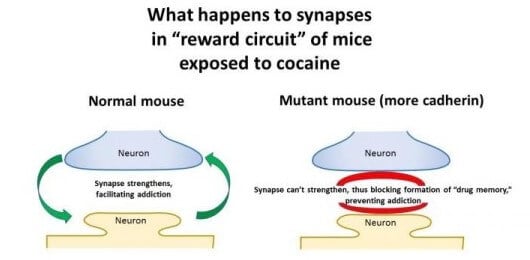Scientists at the University of British Columbia have genetically engineered a mouse that does not become addicted to cocaine, adding to the evidence that habitual drug use is more a matter of genetics and biochemistry than just poor judgment.
The mice they created had higher levels of a protein called cadherin, which…helps strengthen synapses between neurons….
…
[After injecting cocaine into mice, researchers found that] the normal mice almost always gravitated to the cocaine-associated compartment, while the mice with extra cadherin spent half as much time there — indicating that these mice hadn’t formed strong memories of the drug.…
“By preventing the synapses from strengthening, we prevented the mutant mice from ‘learning’ the memory of cocaine, and thus prevented them from becoming addicted,” says graduate student and co-author Andrea Globa.

Their finding provides an explanation for previous studies showing that people with substance use problems tend to have more genetic mutations associated with cadherin and cell adhesion. As studies such as this one illuminate the biochemical underpinnings of addiction, it could lead to greater confidence in predicting who is more vulnerable to drug abuse — and enable people to act on that knowledge.
[The study can be found here.]The GLP aggregated and excerpted this blog/article to reflect the diversity of news, opinion, and analysis. Read full, original post: Scientists create mouse that resists cocaine’s lure































